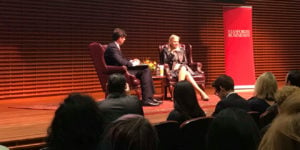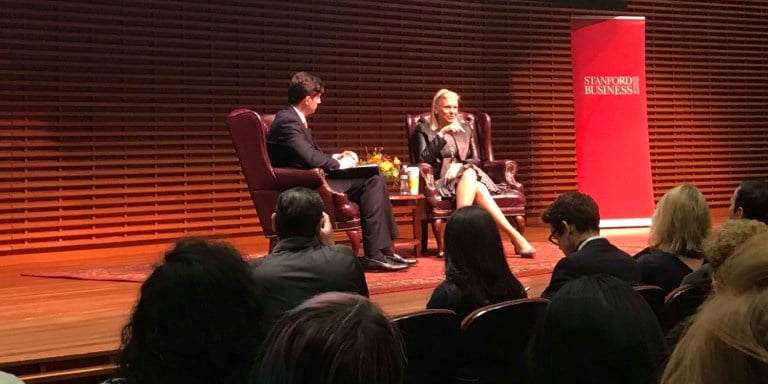“Don’t protect your past,” said Ginni Rometty, CEO of IBM, to her audience in CEMEX Auditorium on Tuesday. “Don’t define yourself as a product.”

Rometty, who also serves as chairwoman and president of IBM, was invited by the Stanford Graduate School of Business (GSB) as a part of their View From The Top student-run speaker series. View From the Top brings in global leaders to share perspectives on leadership, careers and core values.
Her talk, moderated by GSB student Geordie Keelan, centered on what she believes IBM’s role and responsibility should be regarding technological innovation. It also focused on her beliefs about the technology industry, STEM training and education and the importance of inclusion in the technology community.
Rometty opened by talking about her roots — she joined IBM in 1981 as a systems engineer after working for General Motors. When asked by Keelan if becoming CEO of IBM had always been her dream, she said, “It was never a goal.” Instead, she expressed that it was more so a matter of passion and doing something with purpose.
The conversation quickly shifted to the question of how to balance social responsibility with company responsibility. Rometty expressed her views on the importance of transparency.
“Our license to operate is based on trust,” Rometty said. “Society and business will decide if they want to trust you.”
Rometty then discussed how she believes the technology industry should rebrand and re-evaluate itself, especially in light of new advances such as artificial intelligence, with which IBM has done considerable work. She expressed her belief that companies should adhere to three values constituting what she called “principled stewardship”: purpose, transparency and explainability.
“Artificial intelligence [will] augment what man does,” she said.
The future will be “a world of man and machine,” Rometty said, where machines work with humans instead of replacing them. She added that companies should make the purpose of technological pursuits clear by explaining where their technology was trained as well as where the data comes from.
The talk then moved from developing technology to the workforce behind it. Rometty discussed IBM’s Pathways in Technology Early College High Schools (P-TECH) program, a system of six-year public schools that offers instruction in STEM fields to 100,000 students.
“I don’t believe that you have to have a STEM degree or a university degree,” she said, referring to traditional STEM education and its connection to the job search.
She also expressed optimism for the creative use of technology, adding that bitcoin is not the only application for blockchain technology. She suggested that it can also be used to allow companies that usually compete against each other to collaborate for food safety and inspection purposes. For example, retailers would be able to quickly see where food items originated and where they were handled and processed via blockchain.
When asked why Stanford students looking for a job should go to IBM rather than Google or Facebook, Rometty said that she values the strong environment of inclusion at IBM.
According to Rometty, IBM has fought for all-gender bathrooms, immigration reform and DREAMers’ (recipients of the Deferred Action for Childhood Arrivals, or DACA, program) rights, among other efforts. She also said that IBM has a history of prioritizing policy over politics; the company has never made a political contribution in any of its countries of operation.
Rometty acknowledged the potential danger that technology may “create a world of [haves] and have-nots.” She added, however, that certain technologies are more accessible than some might think — the challenge is preparing people to live in this new world, she stated.
“You have to bring [technology] safely into the world,” Rometty said. “Or your job is not done.”
Contact Elena Shao at eshao98 ‘at’ stanford.edu.
